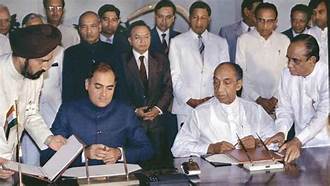

13th Amendment to the Constitution

What is the 13th Amendment?
It is an outcome of the Indo-Lanka Accord of July 1987, signed by the then PM Rajiv Gandhi and President J.R. Jayawardene, in an attempt to resolve the ethnic conflict and civil war.
The 13th Amendment, which led to the creation of Provincial Councils, assured a power-sharing arrangement to enable all nine provinces in the country, including Sinhala majority areas, to self-govern.
Subjects such as education, health, agriculture, housing, land, and police are devolved to the provincial administrations.
But because of restrictions on financial powers and overriding powers given to the President, the provincial administrations have not made much headway.
In particular, the provisions relating to police and land have never been implemented.
Why is it contentious?
The 13th Amendment carries considerable baggage from the country’s civil war years. It was opposed vociferously by both Sinhala nationalist parties and the LTTE.
The opposition within Sri Lanka saw the Accord and the consequent legislation as an imprint of Indian intervention.
It was widely perceived as an imposition by a neighbor wielding hegemonic influence.
The Tamil polity, especially its dominant nationalist strain, does not find the 13th Amendment sufficient in its ambit or substance. However, some find it as an important starting point, something to build upon
Why is it significant?
To date, the Amendment represents the only constitutional provision on the settlement of the long-pending Tamil question. In addition to assuring a measure of devolution, it is considered part of the few significant gains since the 1980s, in the face of growing Sinhala-Buddhist majoritarianism.
Its criticism
Critics argue that in a small country, the provinces could be effectively controlled by the Centre.
The opposition camp also includes those fundamentally opposed to sharing any political power with the Tamil minority.
All the same, all political camps that vehemently oppose the system have themselves contested in provincial council elections.
The councils have over time also helped national parties strengthen their grassroots presence and organizational structures.